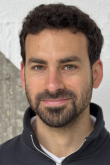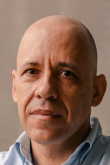
Ignacio de la Serna, Postdoctoral Fellow, Max Planck Institute
Deep learning has revolutionized computer vision, driving face biometric systems to unprecedented levels of accuracy, but also introducing systematic errors that remain difficult to comprehend. This talk explores recent advances in the study of bias in deep face models, showing how disparities arise not just in final decisions, but within the deep feature representations themselves, spanning the learned latent space, neuron activations, and network parameters.
Time and place:
11:00 302-Mountain View and Zoom3 (https://zoom.us/j/3911012202, password:@s3)
IMDEA Software Institute, Campus Montegancedo
28223-Pozuelo de Alarcón, Madrid, Spain

Miguel Á. Carreira-Perpiñán, Professor, University of California at Merced, USA
Decision trees trained using greedy recursive partitioning have existed for decades in machine learning and statistics. However, they have suffered from two critical limitations: they do not optimize a global objective function of the tree parameters, and they use a weak form of partitioning based on a single feature. Recent advances, specifically the tree alternating optimization algorithm, have removed those limitations. This makes it possible to use more powerful types of trees, for example using hyperplane splits, and to apply them to new tasks beyond regression and classification. We illustrate this by showing how oblique decision trees and forests can function as an image model for various applications, such as image segmentation, compression or manipulation for aesthetic effects.
Time and place:
11:00 302-Mountain View and Zoom3 (https://zoom.us/j/3911012202, password:@s3)
IMDEA Software Institute, Campus Montegancedo
28223-Pozuelo de Alarcón, Madrid, Spain

Xinyue Shen, Final year PhD Candidate, CISPA
AI systems like ChatGPT have advanced rapidly, yet their misuse has escalated in parallel. However, we still lack a systematic understanding of how AI systems are misused in the real world and why existing defenses repeatedly fail. This gap results in incomplete or misaligned safeguards, leaving individuals and society vulnerable. In this talk, I will share insights into the misuse of real-world AI systems, which involves understanding user-driven misuse in real-world AI systems, proactively detecting and mitigating AI system misuse, and identifying emerging security risks in the broader AI ecosystem.
Time and place:
10:00 302-Mountain View and Zoom3 (https://zoom.us/j/3911012202, password:@s3)
IMDEA Software Institute, Campus Montegancedo
28223-Pozuelo de Alarcón, Madrid, Spain

Kshitiz Verma, Advocate, Bar Council of Rajasthan, India
Artificial Intelligence has taken the world by storm in the last decade. Given the power artificial intelligent systems possess, it is imperative that they may have negative consequences on health, safety, fundamental rights, democracy, rule of law and environment. It is hence necessary to take an approach towards AI that is cautious of its negative consequences. However, AI is a very powerful technique with potential to boost the economic growth of human civilization. The key is to balance the harms of AI through regulation and at the same time improving economic growth through innovation. The EU’s AI Act is the first comprehensive step in this direction. In this talk, we will cover the object and scope of the Act, to whom it applies. Then we will discuss the classification of various tiers of AI, prohibited, high risk, moderate and minimal going through the examples of each class. AI can enable perfect surveillance and thus there is a direct threat to the privacy of human beings. We will also make a passing reference to the intersection of AI Act with GDPR.
Time and place:
15:00 Online Only - Zoom3 (https://zoom.us/j/3911012202, password:@s3)
IMDEA Software Institute, Campus Montegancedo
28223-Pozuelo de Alarcón, Madrid, Spain

Luis Rodrigues, Professor, INESC-ID, Institute of Systems and Computer Engineering - Research and Development, University of Lisbon
Totally ordered shared logs have become a key component in modern distributed systems, serving as a building block to ensure consistent execution of operations across replicas and partitions. A key challenge in designing this type of systems is to achieve low latency appends, given that total order requires coordination among participants and, in most designs, this coordination is in the critical path of the application. We present a novel design that removes coordination from the critical path, allowing appends to the log to be executed with low latency. We first discuss how this can be achieved in a single datacenter and, subsequently, we introduce a novel technique that allows the same principles to be applied in partially-replicated geo-distributed logs.This talk presents joint work performed by R. Soares (U. Lisboa), L. Rodrigues (U. Lisboa), R. van Renesse (Cornell U.) and L. Alvisi (Cornell U.).
Time and place:
15:00 202-Hill View and Zoom3 (https://zoom.us/j/3911012202, password:@s3)
IMDEA Software Institute, Campus Montegancedo
28223-Pozuelo de Alarcón, Madrid, Spain